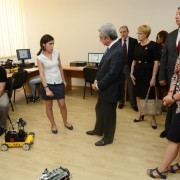Over twenty years on since independence, Armenia in 2013 has demonstrated its resilience and has made strides in its development yet it remains far from ready to “graduate” from assistance. Review of the key indicators of Armenia’s economic, democratic and social transition reveals progress, yet a mixed record on reform. Armenia presents a particularly challenging and unique development context because of its geopolitical constraints and unresolved conflict with Azerbaijan, its energy dependency, the influence of an engaged and diverse Diaspora, Russia’s dominance in major sectors, and the small size and population dynamics of the country.
Yerevan, Armenia – USAID officially launched the Pension Reform Implementation Program (PRIP) at a ceremony held on September 11, 2013 in Yerevan. The goal of the four-year program is to assist the Armenian Government to build its human and institutional capacity to ensure the successful roll-out of the new pension system. The program will support the broader goal of providing old-age income security in an environment that is fiscally sound and sustainable.

Yerevan, Armenia – On September 10, 2013, USAID, the Office of the President of Armenia, the State Engineering University of Armenia and local partners marked the official opening of the newly established Armenian National Engineering Laboratory (ANEL) at the university campus. The goal of the project is to help address Armenia’s shortage of and demand for qualified specialists trained in up-to-date technologies.
Yerevan, Armenia – On May 7, 2013, USAID/Armenia, Yerevan State University (YSU) and Arizona State University (ASU) marked the official opening of the new Center for Gender and Leadership Studies at YSU. The Center will develop a new curriculum in women and gender studies, promote career advancement for women university graduates, conduct outreach activities, and advance public policy research on issues related to gender equality and women’s leadership.
On April 2, the USAID-funded Enterprise Development and Market Competitiveness (EDMC) Project and the Armenian Monuments Awareness Project (AMAP) announced the Black Sea Silk Road Corridor (BSSRC) project, a two-year initiative that fosters tourism development, cross-border cooperation and economic development in 173 communities across four countries of the Black Sea Silk Road Corridor – Armenia, Georgia, Greece and Turkey. A trail of cultural sites will be marked throughout the region.








Comment
Make a general inquiry or suggest an improvement.